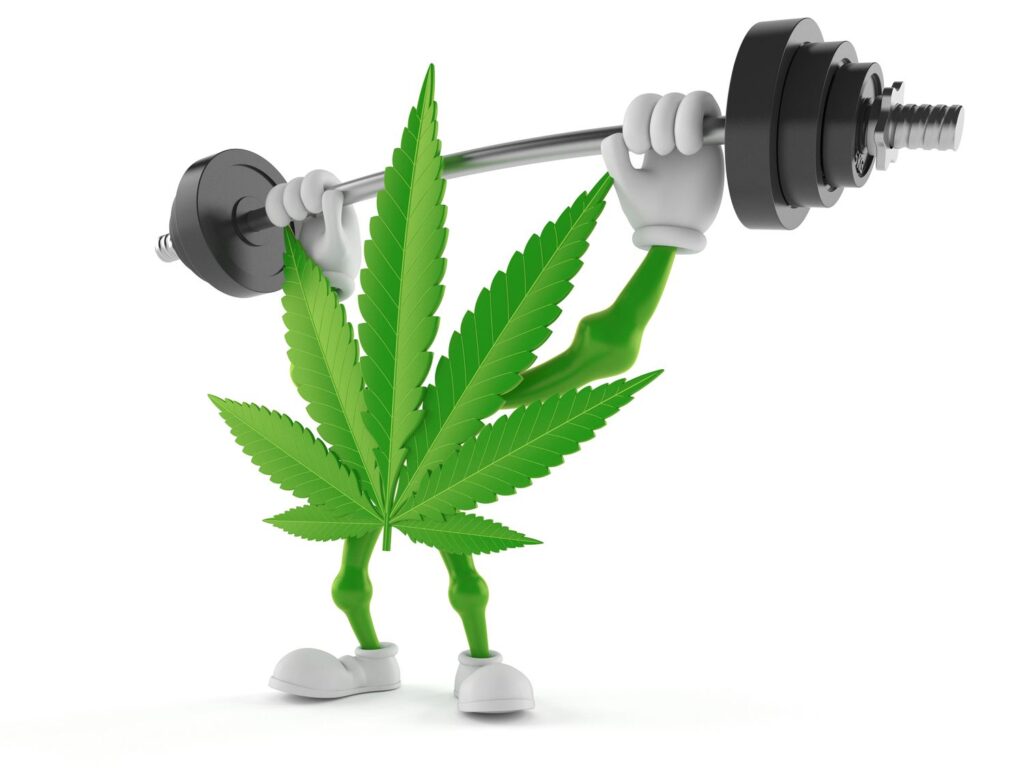Cannabis and Weight lifting
Historically speaking, fitness and marijuana have never been considered the best of workout buddies. You’ve probably thought of them as diametric opposites. In one corner, you had the health and fitness-conscious; in the other, the Cheeto-munching stoners.
“It’s become a social movement,” says Jim McAlpine, founder of the pot-friendly athletic event series the 420 Games, as well as the San Francisco-based, cannabis-friendly gym Power Plant Fitness, which he co-owns with former NFL running-back Ricky Williams. “There are so many of us who are in the closet.”
This got us thinking, does marijuana help in the way some athletes have purported? This article will dive into what cannabis actually is and how it effects the body, where it currently stands with the World Anti Doping Agency (WADA), and what science says about its use and lifting weights. After reading the article check out our dispensary menu for all the cannabis products you need!
Marijuana and the World Anti Doping Agency (WADA)

WADA is an organization that ensures fair play among athletes by prohibiting use of drugs such as weed.
If you compete in drug tested strength sports, then chances are you’re well aware of WADA and their policies. This is the organization that creates the standards for fair play rules, and coordinates guidelines for athlete’s and banned substance use.
Previously, the rules were more strict, as marijuana in many provinces is an illegal drug. But in recent years, as marijuana continues to become more legalized and remains linked to relatively few performance enhancing effects, it seems WADA decided to become a little more relaxed with their positive testing threshold.
Cannabis and Weight Lifting
For Kyle Kingsbury, a retired mixed martial artist, pot became the only reliable non-pill pain reliever.
Kingsbury was a football player at Arizona State who eventually parlayed his athleticism into a career as an MMA fighter on the television show The Ultimate Fighter, then in the UFC. The rigors of his training weren’t without their setbacks, though. Kingsbury was in so much pain at night he’d take four Advil to get to sleep, sometimes popping four more before training. So he circled back to pot as an alternative method of relief.
Kingsbury began experimenting with a combination of THC and CBD, knowing how many blows he was taking to the head.
5 WAYS MARIJUANA EFFECTS YOUR ATHLETIC PERFORMANCE
We spoke to several experts in medicine, fitness, and the cannabis industry about how weed can potentially benefit or hurt your fitness.
Benefit 1: Reduce Inflammation
Adam Brous, a certified yoga instructor and founder of Ganja Guru Yoga in Denver, CO, uses marijuana in his practice and recommends it to his clients for this purpose. “I have worked with athletes who have found cannabis to be a helpful aid,” Brous says. “Typically, they’re dealing with pain and inflammation of the muscles and connective tissue or recovering from past injury or surgery.”
For athletes who want to reap the benefits of CBD’s anti-inflammatory properties without smoking it or getting the high, Brous recommends topical products. “Topicals and tinctures are incredible for locally targeted recovery in highly concentrated doses.”
Benefit 2: Ease Soreness and Pain
Going hand-in-hand with its anti-inflammatory properties, cannabis has also been found to alleviate pain. This is one area of cannabis research that has shown many positive results. Marijuana can alleviate pain caused by everything from chronic pain to acute pain from muscle spasms, studies have found—and that’s good news for anyone looking for alternatives to dangerous, habit-forming opiates.
Benefit 3: Treat Muscle Spasms
Another area of medical application for cannabis is in treating muscle spasms. Cannabis has shown positive results in treating muscle spasms associated with diseases like multiple sclerosis and Parkinson’s, and its benefits could extend to athletes suffering from spasms as well. “There have been studies in rodents showing some beneficial effect in muscle recovery and reduction of muscle spasm, presumably due to the anti-inflammatory properties the compound possesses,” explains Erich Anderer, M.D., chief of neurosurgery at NYU Langone Hospital – Brooklyn.
Benefit 4: Improve Sleep
It’s no secret that THC induces sleep, but studies have also found that it can help people with sleep apnea and even suppress dreams, which is beneficial for those suffering from PTSD. Meanwhile, CBD can ease REM sleep disorder (where people “act out” their dreams) and daytime fatigue. Everyone knows how important sleep is to overall fitness, so this can be extremely beneficial to your athletic performance.
Benefit 5: Improve Mental Acuity
Contrary to popular thinking, marijuana may not have detrimental effects on brain function. In fact, it could be the opposite. Regular, low doses of THC actually restored cognitive function in old mice, according to a June 2017 study published in Nature Medicine. Anecdotally, many of the fitness experts who spoke with us said weed helped them get in the “zone” with their workouts.
“Cannabis has helped my mental game and focus incredibly. Early in my practice, cannabis helped to reduce anxiety, and keep me calm and focused on one task,” he says. “Later, I noticed that cannabis acted as a catalyst to achieve a meditative ‘flow state’ that is crucial to success in athletics.





